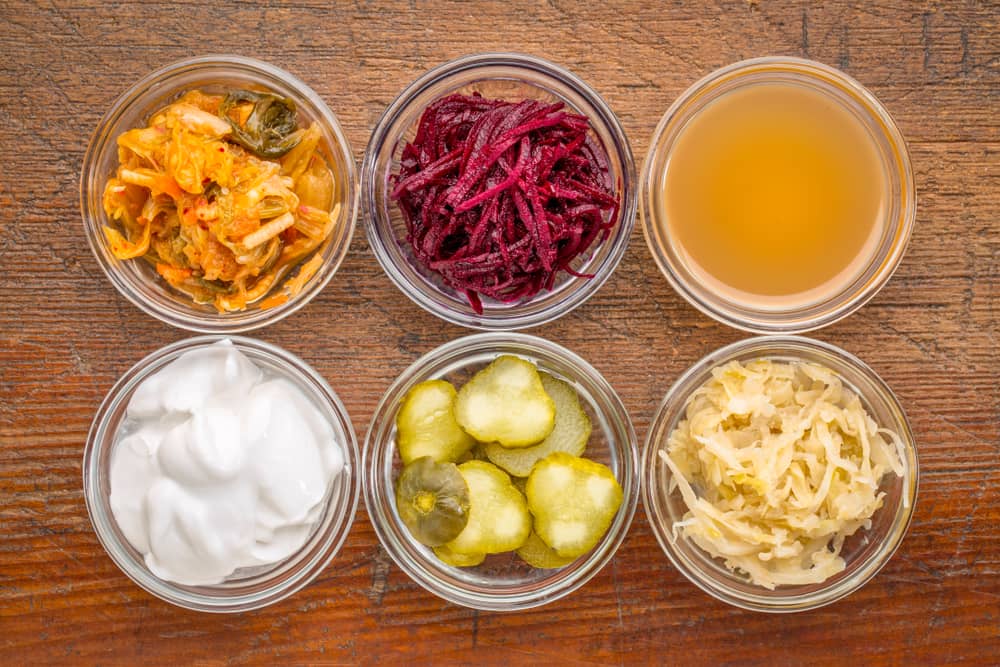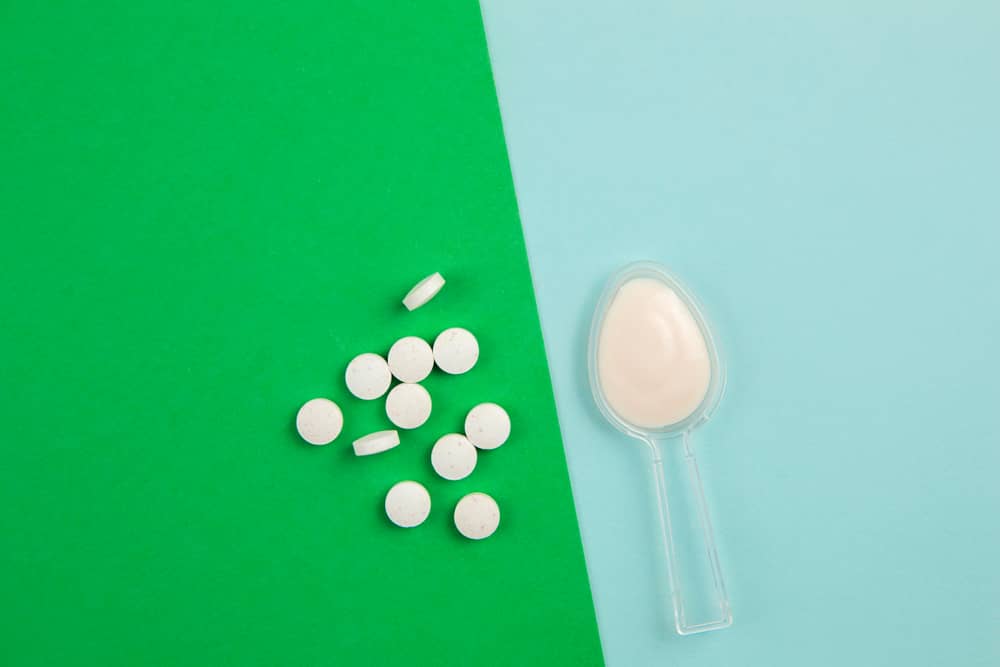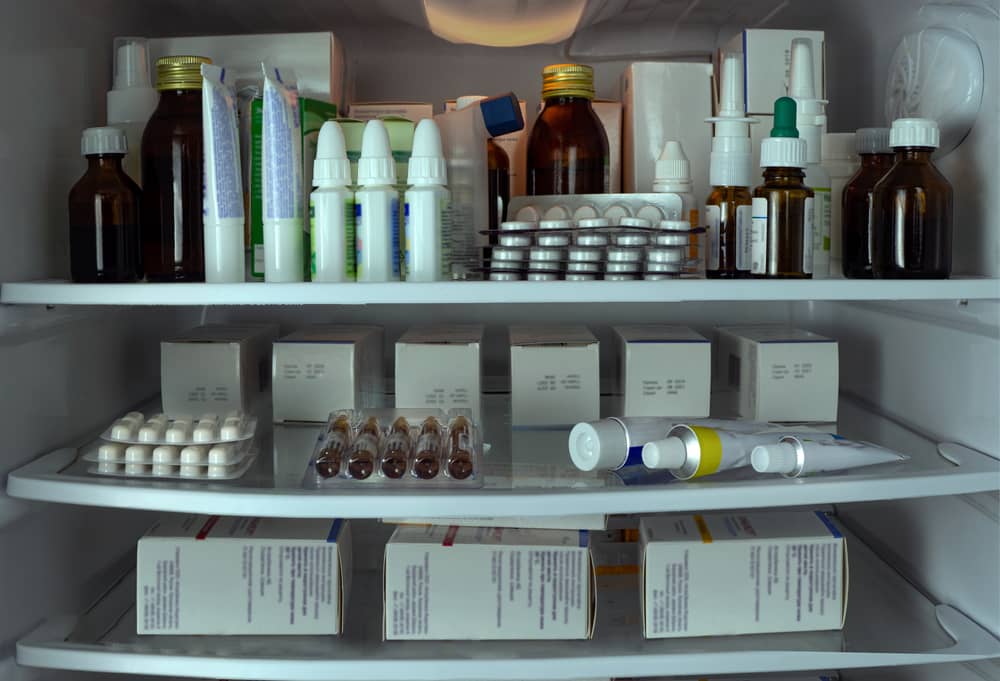Probiotics are often recommended for adults, but are they suitable for children? Can kids take probiotics? If they should, which strain of bacteria is best for them? We’ll explore all of these questions in this article.
Key Takeaways
- Probiotics are live microorganisms that provide a benefit to the host when consumed in adequate amounts.
- Children’s probiotics often come in either a pill form or as chewable tablets.
- The type of bacterial strains in the probiotics matter!
- Studies suggest that probiotics can treat excessive infant crying, treat acute gastroenteritis, prevent antibiotic-associated diarrhea and prevent infections.
Bacteria and yeast are often viewed in a negative light; however, there are different types. Bad bacteria cause disease and infections while good bacteria and yeast are essential to our body and are needed for the regulation of various functions. For example, they play a crucial role in maintaining overall gut health.
Unfortunately, our body doesn’t naturally produce these bacteria and yeast, so we need to supplement them by taking probiotics. Probiotics are live bacteria and yeast that are good for your body. They often come in a pill form, which your children can take with water, or as a chewable tablet.
“According to the Food and Agriculture Organization of the United Nations and the World Health Organization in 2002, probiotics are live microorganisms that provide a benefit to the host when administered in adequate amounts.”
A growing amount of research has found that probiotics can be beneficial to children, so health-conscious parents may want to start incorporating a probiotic supplement into their diet.
So, should children take probiotics? Studies suggest that some of the benefits of probiotics include acting as a treatment for excessive infant crying and acute gastroenteritis, preventing antibiotic-associated diarrhea and preventing infections. The latter is particularly important for children who go to daycare.
The Probiotic Strain Matters
Before you go giving probiotics to your children, you need to first understand that there are different types of good bacteria as well. Depending on your child’s age and biology, a good bacteria may actually be a harmful bacteria for your child and taking these probiotics may result in unwanted side effects.
It’s important that you look into some of the studies to see which probiotic strains they recommend. You’ll need to correlate that with what you’re concerned about, as different bacteria do vastly different things.
Studies that Suggest a Benefit of Taking Probiotics
 Probiotics aren’t necessary for raising healthy children, but they definitely can help. Many studies have found that there are quite a lot of benefits in simply including probiotics in your kid’s meals. To make an informed decision about whether you should include probiotics in your child’s diet, let’s take a look at what some recent studies have found.
Probiotics aren’t necessary for raising healthy children, but they definitely can help. Many studies have found that there are quite a lot of benefits in simply including probiotics in your kid’s meals. To make an informed decision about whether you should include probiotics in your child’s diet, let’s take a look at what some recent studies have found.
#1. Treatment for Excessive Infant Crying
When we talk about kids, we are talking about kids that are as young as 3 months (so infants). Excessive infant crying, otherwise known as infant colic, is a very common, distressing phenomenon that happens to at least 20% of infants. It’s devastating for new parents who barely get enough sleep as is.
The exact etiology for this condition is unclear, but most doctors have attributed it to food allergies or irritability from consuming infant milk with cow’s milk protein. Studies have shown that there is a gut microbial difference between infants who suffer from infant colic and infants who do not.
In order to calm the inflammation and reduce irritability, some studies have looked at administering probiotics to infants.
Recent studies administered oral probiotics versus placebos in infants that are 3 months old or younger, and found that certain probiotic strains are able to reduce crying by a significant margin. This study found that probiotics containing Lactobacillus reuteri seem to show promising results.
#2. Treatment for Acute Gastroenteritis
Probiotics are most well-known for their ability to maintain gut health and to treat conditions like irritable bowel syndrome. In children, doctors diagnose acute gastroenteritis as more than 3 stools a day and a decrease in stool consistency to loose or liquid.
A recent study has found that two types of probiotic strains are particularly beneficial in treating bowel problems. They include Lactobacillus rhamnosus GG (LGG) and Saccharomyces boulardii.
#3. Prevention of Antibiotic-Associated Diarrhea
A harmful bacteria known as Clostridium difficile causes antibiotic-associated diarrhea. Once again, studies show that both Lactobacillus rhamnosus GG (LGG) and Saccharomyces boulardii can help prevent this condition from emerging.
#4. Prevention of Infections
Last but not least, if you send your child to daycare. You probably worry that they’ll catch a bug and infection from other children. Studies show that children who attend daycare are 2 to 3 times more likely to get an infection than children who stay at home. They also have an increased risk of going to an outpatient doctor or to the emergency room.
Recent studies have shown that taking probiotics in general can reduce the risk of respiratory tract infections. These studies were not strain-specific.
Best Probiotics for Children
Choosing the right probiotics for your children can be difficult. The effectiveness of the probiotic will depend on various factors, like:
- Compatibility of condition and Strain. As mentioned above, different types of probiotic strains are more suited for certain conditions. To ensure that your child is getting the most benefits of the probiotics, make sure that you match the condition with the strain. Should children take probiotics? It really depends on the condition you want to treat and the strain of bacteria that the probiotics contain.
- Does. The amount of good bacteria that is in the probiotics is also important. In general, most studies find that a dose of about 5 billion CFUs or higher tends to be more effective. The dose will vary by brand.
Some foods have probiotics in them as well, so you don’t always have to rely on probiotic foods. Learning about the best probiotic foods for children can help you make an informed decision.
When it comes to probiotic supplements, there are just so many different options available on the market. We’ve taken a look at the probiotics available for children and here are our recommendations.
Garden of Life Dr. Formulated Organic Kids' Probiotic
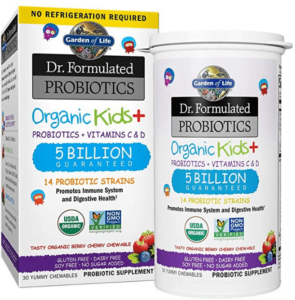 This probiotic checks all of the boxes for what you’d typically look for in a child’s probiotic. It’s made with organic ingredients and free of any sugars and sweeteners. Most importantly, it contains 5 billion CFUs of healthy bacteria and 14 different probiotic strains in each chewable tablet. It also contains 30 milligrams of vitamin C and 400 IU of vitamin D to give your child’s immune system an added boost.
This probiotic checks all of the boxes for what you’d typically look for in a child’s probiotic. It’s made with organic ingredients and free of any sugars and sweeteners. Most importantly, it contains 5 billion CFUs of healthy bacteria and 14 different probiotic strains in each chewable tablet. It also contains 30 milligrams of vitamin C and 400 IU of vitamin D to give your child’s immune system an added boost.
The tablets are berry-flavoured and taste just like candy. It’s kid-friendly and parent-approved!
SmartyPants Kids Probiotic Immunity Gummies
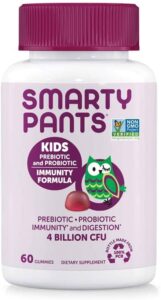
Make eating probiotics fun by giving your child some gummies instead. These probiotics are much more popular amongst children. They are grape-flavoured and taste just like candy. The probiotics contain mainly Bacillus subtilis and Bacillus coagulans, which promote healthy digestive tracts, and also contain prebiotics that strengthen the immune system. The gummies are AVA-certified vegan and contain no synthetic colors, artificial flavors or sweeteners.
The only downside about this product is that it contains about 4 billion CFUs per serving, and you would ideally want to aim for 5 billion CFUs.
BioGaia Protectis Probiotics Drops
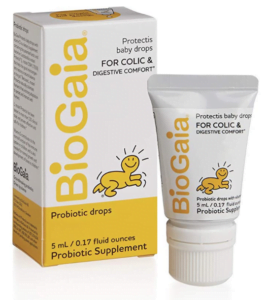
If your kid can’t chew gummies or tablets, you can’t go wrong with these probiotic drops. These probiotics are designed mostly for babies who suffer from infant colic and digestive discomfort. They are super easy to apply and contain the probiotic strain, L. reuteri, that’s best known to reduce excessive infant crying. Just administering 5 drops, once daily, can make a huge difference. These drops contain non-GMO ingredients and no artificial flavors and colors.
The drops can even be added to infant formulas to improve the amount of healthy gut bacteria that’s residing in your infant. Many parents have seen great results with this probiotic and their child is much less folicky and fussy.
Speak with Your Child’s Doctor
Right now, the Food and Drug Administration (FDA) does not have a recommended dose for infants and children, so you’ll need to play it by ear. The best solution is to simply ask your child’s doctor what they recommend, and whether your child is a good candidate for this, as those who have a compromised immune system may not necessarily benefit from taking probiotics.
It would be best if you know exactly what type of symptoms or conditions you want to treat as well, as this could really help your doctor make a better decision in which strain of bacteria you need to look for in probiotics for kids. In general, if you have a healthy baby or child, the probiotics will do more good than harm, as the health benefits of probiotics are plentiful.


